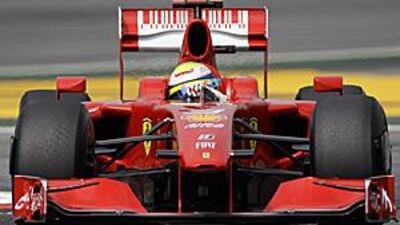A Ferrari resurgence is on the cards following a one-two for Felipe Massa and Kimi Raikkonen in final practice ahead of qualifying for the Spanish Grand Prix. The team have so far endured the worst start to a season in their illustrious history, with Raikkonen finally ending their points drought with a sixth-placed finish in Bahrain a fortnight ago. As for last season's title contender Massa, the Brazilian is now in his seventh season in F1 and has never before gone through the first four races without scoring a point. But that is the position he currently finds himself in ahead of the start of the European season at Barcelona's Circuit de Catalunya. However, Massa brushed aside their problems today with the fastest lap of the weekend so far, posting a time of one minute 20.553 seconds, just over a second quicker than Nico Rosberg's best from yesterday.
As if to underline the prospect of a comeback, Raikkonen finished just 0.082 secs behind Massa, with the duo almost half a second quicker than their rivals, led by Brawn GP's Jenson Button. The current championship leader holds a 12-point cushion at the top of the standings from teammate Rubens Barrichello who was fourth. BMW Sauber's Robert Kubica was fifth, followed by the Toyota of Jarno Trulli and reigning world champion Lewis Hamilton in his McLaren. Hamilton finished yesterday's practice sessions extremely unhappy with the performance of his car, but after working long and hard overnight, the team's mechanics have clearly found some speed. Toyota's Timo Glock, Toro Rosso's Sebastien Buemi and home hero Fernando Alonso for Renault completed the top 10. They were followed by Heikki Kovalainen in his McLaren, with the leading 11 separated by under a second. Championship contender Sebastian Vettel was a lowly 16th in his Red Bull, with Nick Heidfeld at the rear of affairs after a seemingly troubled session. The German, who yesterday suffered a brake issue in first practice, completed just eight laps, all early on, finishing nearly three seconds behind Massa. Qualifying for tomorrow's race starts today at 1pm (4pm UAE time).
*PA Sport

